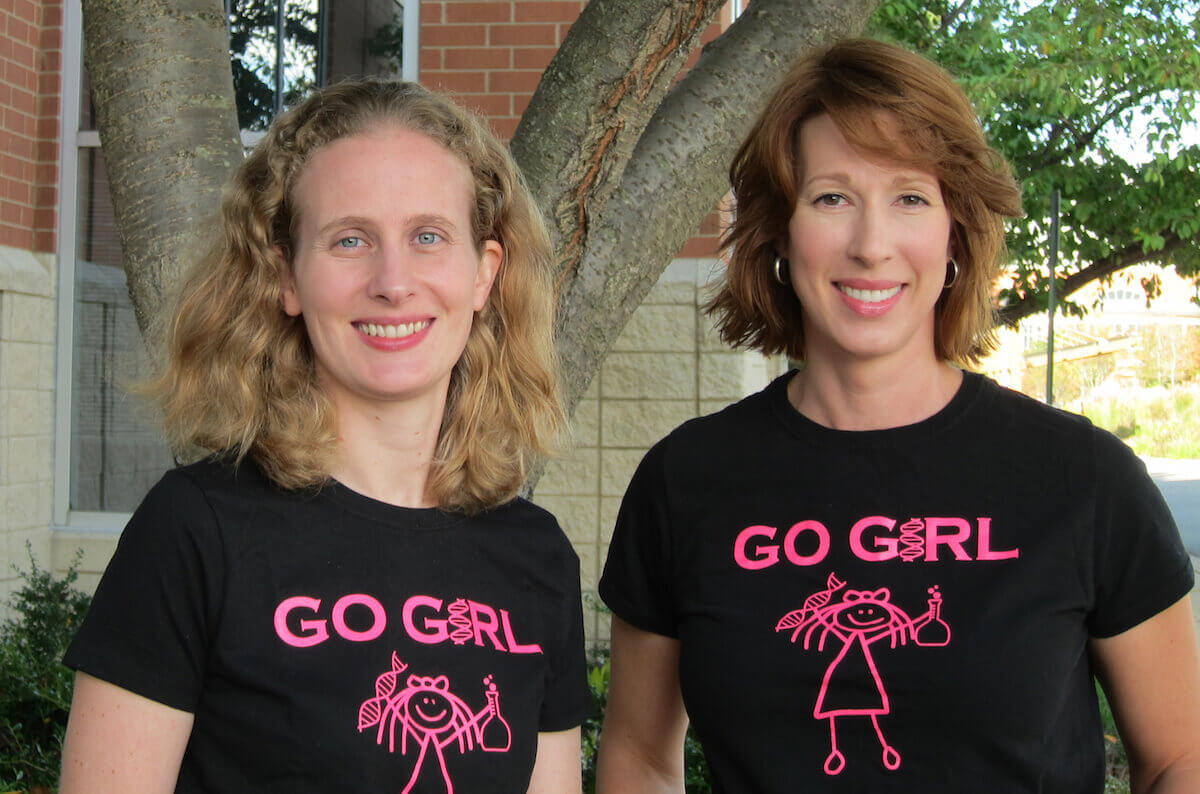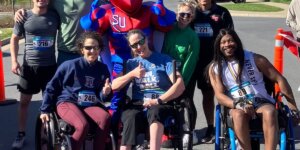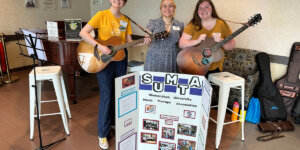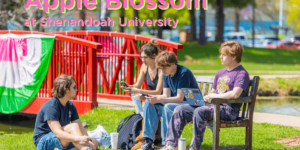Earlier this semester, Genomic Opportunities for Girls in Research Labs or, GO GIRL, won a New England BioLabs (NEB) 2016 Passion in Science Award, which acknowledges scientists for inspirational and innovative work that transcends the boundaries of pure science, and has profound impact on other fields, including the arts, humanitarian service, environmental stewardship and science mentorship. The award was given under the mentorship and advocacy category.
GO GIRL is an educational outreach program for high school girls designed to demystify genomics – a discipline notoriously intimidating to young scientists – thus, empowering them to consider a career in science, technology, engineering, mathematics (STEM). GO GIRL represents an important partnership between the George Washington University, which hosts the program on its Virginia Science and Technology Campus (VSTC) in Ashburn, Virginia, and Loudoun County Public Schools (LCPS), from where program participants are chosen.
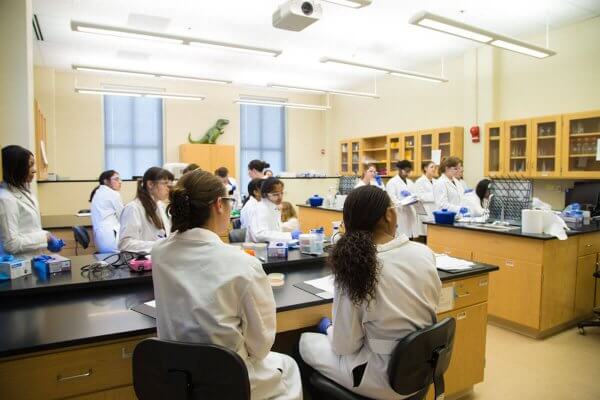 The GO GIRL program was co-founded in 2009 by Associate Professors of Pharmacogenomics Amanda Munson, Ph.D., and Tracey “T” Nickola, Ph.D., along with former Assistant Professor of Pharmacology and Physiology at the George Washington University School of Medicine and Health Sciences Nancy Skacel, Ph.D. Dr. Munson and Dr. Nickola continue to run the program to this day.
The GO GIRL program was co-founded in 2009 by Associate Professors of Pharmacogenomics Amanda Munson, Ph.D., and Tracey “T” Nickola, Ph.D., along with former Assistant Professor of Pharmacology and Physiology at the George Washington University School of Medicine and Health Sciences Nancy Skacel, Ph.D. Dr. Munson and Dr. Nickola continue to run the program to this day.
Munson recently traveled to the NEB headquarters in Ipswich, Massachusetts, to accept the award on behalf of the team. Here, Munson reflects on how it felt to win the award, what it was like to travel to NEB headquarters, and the importance of GO GIRL and programs like it:
Applying for and winning the award
All three of us were fairly fresh out of our own educational journeys at the time we started GO GIRL in 2009. We understood on a very personal level the importance of mentorship and positive role models for women in science and wanted to share our enthusiasm and experiences to help the next generation of women in science gain the confidence to pursue and persist in a STEM career.
When T and I saw the advertisement for the NEB Passion in Science Awards Advocacy and Mentorship category, it seemed like a perfect fit for what we believe in about science outreach. T and I certainly didn’t establish GO GIRL in order to receive this type of recognition, and as a small program, we weren’t sure how competitive we would be in an international applicant pool. But GO GIRL participants and their parents tell us how big an impact GO GIRL has made on their academic and professional choices, so we knew GO GIRL was something special.
When we heard I would be representing our work with GO GIRL for the NEB Passion in Science Awards, we were stunned and incredibly honored. There may also have been some ear-to-ear grins and maybe a bit of screaming with joy.
Traveling to NEB headquarters
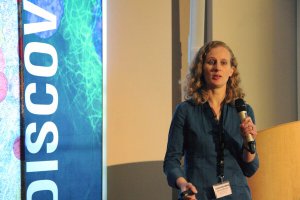
Associate Professor of Pharmacogenomics Amanda Munson, Ph.D., presents information on the GO GIRL program at NEB headquarters in Ipswich, Massachusetts.
From a science-geek perspective, NEB is a well-known name in molecular biology; they have been my go-to vendor of basic molecular biology lab supplies for years. Being able to visit NEB headquarters was pretty surreal.
Science-geek aside, the people I met there were amazing. We spent a day learning about the diverse contributions that other scientists, from undergraduates to tenured professors, were making in the areas of advocacy, mentorship, humanitarianism, environmentalism and the arts. It was incredibly humbling to be among such a creative, enthusiastic and giving collection of people. Among other things, I got to see art made of neurons, hear about a water filtration system that could be made from common household items for the rural poor in the developing world, learn about converting used plastic back into petroleum, and how a bacteria that normally infects mosquitoes has the potential to prevent the transmission of dengue. The general consensus of all the awardees was that we were all so blown away by the great things the other awardees were doing.
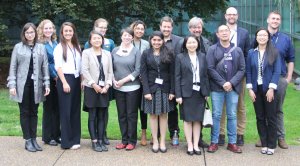
Associate Professor of Pharmacogenomics Amanda Munson, Ph.D., is pictured (second from left) with fellow NEB award winners.
It was amazing to be surrounded, if only for two days, by such inspiring people. NEB values passion, humility and genuineness, and it was clear in talking to their employees and the other award recipients that everyone there exemplified these values. I met several employees at NEB who came up to speak with me about our work with GO GIRL and how it aligned with their own interests and passions and inspired them. It was very humbling when one employee told me that GO GIRL inspired him to reach out to students in socioeconomically disadvantaged communities and get them interested and involved in science.
Why programs like GO GIRL are needed, and what makes GO GIRL special
There are lots of ways to do science outreach, but two keys are exposure and mentorship Exposure to science is certainly important. After all, if you never hear about something, you will never know if it interests you. Large organizations have the funding and the people to do this and can do this very well.
But just like it can be challenge to get a personal feel at a large university, it can be hard to get a personal feel in a large program; small programs are able to provide a more personal touch. By showing that science has connections to real people and the real world, it becomes more approachable, accessible, and applicable. Another important aspect is mentorship along the educational and professional pathways. This helps people navigate any of the “tough spots” that invariably arise along the way.
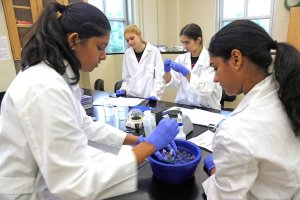 Because GO GIRL is a small program, we can bring the girls into our teaching and research lab and work with the them to make the content personal (they do their own mini DNA fingerprints). We also make a point to use real-life scenarios in our teaching to help them find personal connections to the science (they get to correlate their own genetic make up with their ability to taste a bitter substance).
Because GO GIRL is a small program, we can bring the girls into our teaching and research lab and work with the them to make the content personal (they do their own mini DNA fingerprints). We also make a point to use real-life scenarios in our teaching to help them find personal connections to the science (they get to correlate their own genetic make up with their ability to taste a bitter substance).
We also have the ability to provide some really great mentorship opportunities during the program. Not only do the girls meet peers with similar interests, they meet near-peers (college undergraduates, graduate students, and professional students), as well as professionals in the biomedical fields. These mentorship opportunities really help put a personal and authentic face to the field and give the girls confidence as they move forward. It’s these personal touches that small programs can do well and are what make GO GIRL special.
While GO GIRL is a reflection of its founders’ expertise and experience, the beauty is that the GO GIRL “recipe” of authenticity and personal connections (to the people and the material) is versatile. We’ve met with local and international groups to discuss what makes GO GIRL work and have seen some new small programs develop, and at NEB I learned it has inspired others. If everyone reached out in a way that was authentically them, we could all make small, meaningful differences that aggregate into something much bigger.
Where does GO GIRL go next?
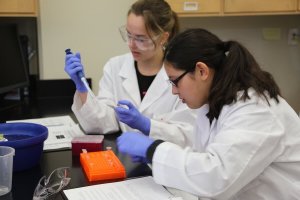 About half of the GO GIRL participants could potentially be college graduates now and anecdotally, we know that several of our former participants are currently in, or applying to, graduate and professional programs. We have plans to follow up with all of our GO GIRL alumnae, see where they are now, and find out if GO GIRL has had a long-term impact on them.
About half of the GO GIRL participants could potentially be college graduates now and anecdotally, we know that several of our former participants are currently in, or applying to, graduate and professional programs. We have plans to follow up with all of our GO GIRL alumnae, see where they are now, and find out if GO GIRL has had a long-term impact on them.
T and I deeply believe in science mentorship and education, so we’ve definitely talked about what else could be done. Research has shown that the identification of “science is for me/science is not for me” occurs late in elementary school or in middle school. Although we receive 80+ applicants for only 16 positions each year, we know that only 1% of the potential applicants to GO GIRL actually apply. Based on that, T and I would like to reach out to middle school girls – to pique their interest in science early in the academic pipeline. The maturity and educational experiences of middle schoolers are quite different compared to high schoolers, so there are a lot of details to work out and determine how we might utilize our expertise and resources to reach this different group.
Updates for GO GIRL program:
The GO GIRL faculty are moving to another campus this summer. Regretfully, there will not be a GO GIRL camp in 2017.
GO GIRL (Genomic Opportunities for Girls In Research Labs) is an educational outreach program designed to provide a unique opportunity for young women interested in gaining hands-on laboratory experience in molecular biology and genomics. This four-day summer program is a joint effort between The Bernard J. Dunn School of Pharmacy, The George Washington University, and Loudoun County Public Schools. The 2016 program will be held at the GW Virginia Science and Technology Campus in Ashburn, Virginia June 21 – 24 (Tuesday – Friday), from 9:30 am – 3:30 pm and is open to rising 10th, 11th, and 12th grade young women from Loudoun County Public Schools.
